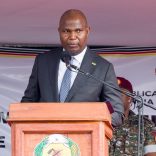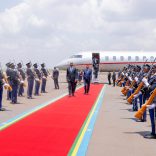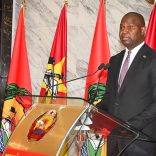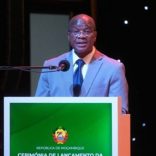Mozambique: President rejects violence to solve conflict on anniversary of Mueda massacre
Assembly approves its own budget

File photo
The Mozambican parliament, the Assembly of the Republic, on Tuesday approved its own budget for 2017, with all opposition deputies abstaining and protesting that the Assembly could not do its job properly unless it received more money.
The total budget approved is 1.181 billion meticais (about 16.3 million US dollars). Of this sum, 1.106 billion meticais comes from the 2017 state budget, and 75.4 million from assorted foreign donors and partners (the European Union, the United Nations Development Programme, and the Westminster Foundation).
As happens every year, deputies from the rebel movement Renamo complained that the budget was nowhere near large enough to allow the Assembly to monitor the activities of the government.
“The government wants to subordinate the deputies”, complained Juliano Picardo, ignoring the fact that the government only proposes the state budget, and it is the Assembly that approves it.
“The limits imposed by the government mean that this budget only covers 76 per cent of the Assembly’s needs”, Picardo claimed.
But Mateus Katupha, of the ruling Frelimo Party, pointed out that the original proposal from the Ministry of Economy and Finance was for a much smaller allocation to the Assembly. In the draft state budget that allocation was 977 million meticais.
There was no way this could cover the Assembly’s running costs, Katupha lamented, and it meant that the Assembly’s chairperson, Veronica Macamo, would have to negotiate an increase – as she had done in previous years.
Macamo and the deputy chairperson, Antonio Amelia, assured the deputies that was precisely what the Assembly’s leadership was doing. “There have been meetings with the government to resolve this deficit, and reduce the gap between our proposal and that of the government”, said Amelia.
By far the largest item in the budget is euphemistically described as “other expenses on personnel”, and amounts to 555.3 million meticais. This covers the wages and allowances paid to the deputies themselves.
Unlike the Assembly budgets of the 1990s, no details are given on how much each deputy is paid. Chairpersons and members of commissions are paid more than deputies who do not sit on commissions, but this specific information is missing. Nor does the budget state exactly how much will be spent on rent allowances, constituency allowances and entertainment allowances.
It is however easy enough to work out an average figure, and it turns out that, in 2017, each deputy will be paid, in wages and allowances, an average of 185,842 meticais (2,563 US dollars) a month.
The lowest of the country’s statutory minimum wages is 3,298 meticais a month (for agricultural workers). Deputies earn, in wages and allowances, 56 times that sum.
The other major items in the budget are the wages paid to Assembly employees (162.5 million meticais), goods and services (196.2 million), and current transfers, including membership fees for international bodies, and medical care (128 million).
The capital budget breaks down into 63.7 million meticais from the state budget, and 75.4 million from the Assembly’s foreign partners.
When the vote was taken, the budget passed with the 135 Frelimo deputies present voting in favour and 85 deputies from Renamo and the Mozambique Democratic Movement (MDM) abstaining.













Leave a Reply
Be the First to Comment!
You must be logged in to post a comment.
You must be logged in to post a comment.